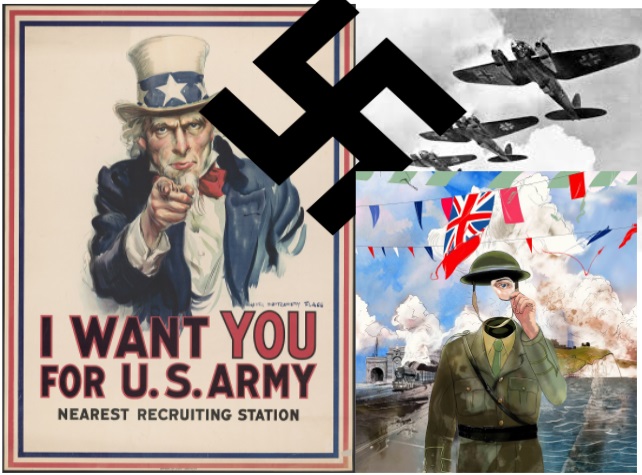The Genesis – the need for nationalism
The winner of the Gold Medal in the Olympics stepped on the podium. The medal was hung around her neck and then the national anthem of her country was played. Her countrymen, whether present in the Stadium, or watching her from their homes, felt an enormous sense of pride and joy, to the extent of getting goosebumps. Hearing the national anthem being played, all standing in unison, with hands-on their hearts, is an overwhelming experience. But, have we ever wondered why?
What is bonding? What connects people, what binds societies and what underlies the idea of shared identity? We live in a world where both the creation and destruction of ideas happen in moments. What then becomes the source of social order? Let us try and figure these questions out.
The need to collaborate was always a response to the events that ‘happened’ to humans. A lone hunter felt powerless in front of the colossal forces of nature and was forced to collaborate – for survival! The larger the band became the more resources it could tap upon. More in a group allowed a slight distribution of work and some space for recreation and procreation, also helping the process of propagation of human genes to the future. It also provided an opening for thought and progress, and the band marched on!
The hunter-gatherer saw seedlings emerge from seeds spread on moist earth – viola! Our hunter-gatherer community of the past evolved to a more settled agricultural civilization, with more time, safety, energy and creativity in its hands.
Fast forwarding, we arrive at a more mechanised industrial world of today where the demand for collaboration has only increased. The communities had become larger as the return from these collaborations became more promising and palpable. In that continuum, the concept of nation and state was born – both the latest additions to the system of organisation.
Thus, when the communities were extended and structured, nations emerged. Their emergence was a response to the need to build political communities based on shared political ideology, emotional belongingness and territorial allegiance. It gave a common identity and encapsulated common entitlements and obligations that emanated from this identity.
To maintain continuity of this allegiance, it was required that masses should feel motivated from within to feel part of the larger ‘whole’. Masses needed to feel a commonality with the idea of “We – The People” and differences from “them – the others”! And thus, emerged the notion of ‘nationalism’. Simply put, it connects people with the nation and ensures the continuity of this connection. It is what makes the hairs on the back of our neck stand during an Olympic Medal ceremony national anthem.
From Consensus to Conflict
7th of December, 1941, an aircraft of the Japanese Navy bombed the fleet of the United States of America stationed at Pearl Harbour. The incident forced the hand of a reluctant United States in joining, which would later become the bloodiest and most horrific war of the history of humankind – the Second World War. At the same time in Europe, some powers fuelled by their desire to expand, had created a situation of bloodlust and devastation. What was the driving factor behind all this carnage? The answer, in part, is ‘Nationalism’.
Nationalism is not only credited with building communities but also, as we saw above, for bringing communities to war. After all, it’s an ideology, replete with opportunities for misuse. History has enough evidence of the most gruesome acts that were committed out of the use of ideological indoctrination – be it the horrific holocaust or apocalyptic drop of atom bombs (both associated with the Second World War)!
In this divisive capacity, it pushes to shift from ‘national solidarity’ to ‘national exclusivity’. It relates more with the political strategies for possession and expansion, destructive links with race or ethnicity leading to mass genocides, giving religious justification for state-sponsored terrorism, carrying prolonged warfare to occupy the ‘divinely designated’ piece of land, indoctrinating its people for carrying out suicide missions like a kamikaze to inflict ‘mass destruction’ in the ‘interest of the nation’ and other such manifestations. Thus, the demand and ‘maintenance cost’ of nationalism keeps on expanding. Even with the heavy price that it comes with, it offers very little scope in tackling the present-day trans-national obstacles.
Narrow Nationalism Outsized Obstacles
In the book 21 Lessons for the 21st century, Yuval Noah Harari has substantially depicted how Nationalism is just way too narrow to deal with the outsized obstacles that beset the globe today – the trio of technical disruptions, nuclear challenges and ecological disasters.
The first such challenge is the heightened levels of ecological uncertainty. The anthropogenic actions of humans have pushed the planet to the verge of existential crisis. “Exclusionary’ nationalism” – that sees the discrete nations as different from and superior to the ‘whole’ – offers no viable solution to this. Even with warnings from multiple studies, no global consensus is yet established to take concrete actions. The political elites just refuse to acknowledge that no country can traverse sustainable development if the planet is nearing the tipping point – beyond which there is no comeback!
Second, comes the blind race by different countries to inflate their respective nuclear arsenals. Acquisition or indigenous development of nuclear weapons is represented as nationalistic glory. Even after witnessing the horrific consequences that such weapons had on Hiroshima and Nagasaki, nations did not stop stockpiling them. Fanatic nationalism only offers fuel to this blind race, let alone providing a solution!
The third such challenge is the unprecedented and unregulated pace of technological disruptions happening in many new areas like Artificial Intelligence, Biotechnology, nanoscience and so on. These technologies have the potential to solve many of the above-mentioned problems, along with the inequities in health and education. But the popular discourses of foreign policy vouches for prioritising ‘nations interest’ first. This is often given as justification for restricting the sharing of such innovations with ‘other nations’. The reluctance of the ‘developed nations’ in sharing green technologies or even technology to develop vaccines during a global pandemic only shows how toxic this ‘national interest’ can become. Putting ‘national-interest’ first is veritably practical, but doing so by compromising the larger interest of mankind is ‘extremely parochial’ and in the long run ‘self-detrimental’!
The world must wake up to these challenges and go beyond short-sighted nationalistic ambitions, adopting a more far-sighted approach. The world must be better served if it keeps this proverb in mind – “As you sow so shall you reap”.
Finding the Functional Relevance
So, in the context of the questions raised above, is it justified to conclude that nationalism has no potential and it’s rather ‘a monster in the guise of a monk’? Does this mean ‘nationalism’ as an idea has lost all relevance in the modern world beset with more universalistic challenges?
Well, far from it, the fact remains that nationalism is a prerequisite for the stable functioning of large socio-political structures of modern nation-states. It minimises anarchism and upholds the value consensus in envisioning the ideal state’. The problem surfaces with the shifting inclination from ‘pursuit for the progress of a nation’ to the ‘belief in exclusive superiority of one’s own nation’. The latter only breeds chauvinism and jingoism!
It is at this point that we need to demarcate between narrow nationalism and inclusive nationalism. What we need and what also emanated from the core ideas of Rousseau (slamming subversion and coercion in his “Social Contract”), Voltaire’s argument for freedom of religion and expression (Candide) and Diderot’s highlight of the scientific and broadened way of thinking (Encyclopedie); was actually the foundational framework that originally sparked the spirit of nationalism in different parts of the globe. This inclusivity of nationalism is also what was envisioned by the founding fathers of the Indian constitution.
What is needed is to cherish the idea of civic nationalism, instead of glorifying ethnic nationalism. Ethnic nationalism only glorifies the ‘ethnocentric’ worldview that is neither inclusive nor accommodative and perceives things in terms of ‘us’ versus ‘them’! Instead of striving for a universalistic stand against global challenges, this view vouches for the parochial and illusionary national interest. They wishfully ignore that there is simply no space for “national interest” when the challenges are by all measures “global” and the nations are immensely interconnected.
Civic Nationalism, on the other hand, builds upon the ideas of citizen centricity, state responsibility and global consciousness. It focuses on the idea of ‘Nyaya’ by reshuffling priorities – shifting focus from rhetoric to the eradication of poverty, social deprivations, discriminations and inequalities – in all its forms. It still aims for “making my nation great”, but not by creating dependencies, but by building collaborations. It is not a utopian concept but a practical acceptance of the reality that no single nation is self-sufficient enough to tide over the new arenas of global threats and insecurities. Each country needs to prosper for the collective prosperity, in fact, the very continuity of mankind and even the planet!



Excellent background image.. Well done!